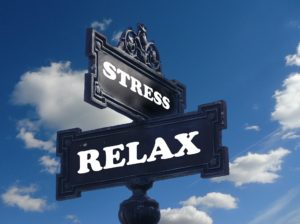If you’re one of those people who get headaches on the weekend, you might be experiencing something called the Letdown Effect. It may seem odd that your headaches occur on the weekend when you have time to relax, but it’s actually fairly common, and has a lot to do with stress—or when stress goes away.
The Letdown Effect is a phenomenon that occurs after a stressful period has ended, and is very real, as explained by Dr. Mark Schoen, author of the book, When Relaxation is Hazardous to Your Health. Studies have revealed that more people have panic attacks on the weekends than during the week, more people are admitted for emergency care on Sundays for peptic ulcers, and people who suffer from migraines are measurably impacted by a decline in stress.
 Schoen explains that during stressful times, your body releases stress hormones, including cortisol, which helps to protect you from the perception of pain. This decrease in pain awareness allows you to do what you need to get through a stressful period and keep it together. However, after the stress has dissipated your body wants to get back to normal, but you’ve taken a physiological hit. Your immune system downshifts, and a build-up of prostaglandins, which are chemicals in your body that can trigger inflammation, are left over from your physiological reaction to stress.
Schoen explains that during stressful times, your body releases stress hormones, including cortisol, which helps to protect you from the perception of pain. This decrease in pain awareness allows you to do what you need to get through a stressful period and keep it together. However, after the stress has dissipated your body wants to get back to normal, but you’ve taken a physiological hit. Your immune system downshifts, and a build-up of prostaglandins, which are chemicals in your body that can trigger inflammation, are left over from your physiological reaction to stress.
In Chinese medicine, the Letdown Effect might be compared to something called a Liver and Spleen disharmony. Simply put, this means that stress and emotions have depleted your energy, messed with your appetite or digestion, hampered your immunity, and thrown your body’s systems out of balance.
While you can’t always predict life’s bumps or neutralize an annoying boss, there are some things that you can do to diminish the effect of the Letdown Effect during times of intense stress. The first is to be aware that it’s real, and to practice good self-care during and after stressful and demanding periods. Some other things that you can do include:
-Get enough sleep. Your body regenerates and repairs itself when you’re sleeping, so intensely stressful periods are not the time to shortchange yourself on sleep.
-Eat well. It may seem easiest to get your meals from the drive through window when you’re stressed, struggling, and crunched for time, but eating well helps to keep your energy up and your digestion on track. Whole grains, lots of fruits and vegetables and light proteins will serve you well.
-Keep moving. Exercise may feel like one more thing you have to when you’re overwhelmed, but moving your body helps relieve stress, clear your mind, and can even help boost your immune system.
-Calm you mind with meditation, guided imagery, or breathing exercises. Can’t meditate? Try one of the apps that offer relaxing music, talks, and guided meditations. My favorite is Insight Timer, which has thousands of options, and it’s free.
-Play some mind games. Puzzles and word games that engage your mind are actually relaxing and can distract you from constant worry and stress.
-Spend some time outdoors, in the woods if possible. A great body of research has documented that time spent in a natural environment is calming and can decrease stress, lower your blood pressure, and boost your immunity.
-Choose acupuncture. While many people think that acupuncture is only useful for physical symptoms, research has shown that it alters your brain chemistry in a good way. During and after acupuncture, feel-good endorphins are released, giving you an overall feeling of calm that can last for days afterward.
The Letdown Effect is very real. It explains a number of weekend maladies and why teachers get sick during school breaks. Knowing that your body may react when stress is relieved can help you anticipate the change and take good care of yourself.



